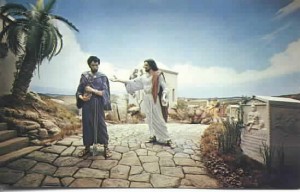If you want a Biblical argument just bring up the Book of Job. The interesting thing about this experience is that all but one of the arguments will sound like the reasonings of Job’s “friends” who had come to offer him “comfort.” But anyone who knows the story knows that when God finally shows up to explain Himself for allowing this perfect man to suffer so, He first rebukes these false counselors. The reason for this dichotomy is that the real moral of the story of Job — that God’s lesson to him was that “I’m God and you’re not” — is so discomforting, at least to we in the affluent West.
As written it is a wonderful parallel to the other most controversial tale of the Old Testament — Adam and Eve in the Garden of Eden — also, as it is written. Both are stories of having it all and then losing it all and then gaining it back. In Job the getting it all back part is included as an addendum at the end of the story. For Adam and Eve the rest of the Bible is that addendum.
A Zen saying: Above is a river flowing — below the vast ocean. In between them is a waterfall. The totality of our individual conscious lives occurs between the river and the ocean.
We are all in the “in between” phase of life. None of us has any real knowledge of the befores or the afters. But the place we are in is a place of loss. We are in the realm of “Life is a bitch — then you die.” The goal of getting a lot of money is Western Civilization’s answer to alleviate the former half of that “bumper-sticker” statement. No one has an answer to the latter. In fact, the longer medical “miracles” can push back the inevitability of death, the harder it becomes to escape life’s hardships no matter how much money you have.
This is where Adam and Eve were banished to. And you don’t get back into Paradise where all the animals are our friends and we just have to sachet around naked picking fruit to eat just by practicing some ancient cleansing ritual and confessing our sins. We are here to stay — for now.
Here we come in close contact with things and people we love and cherish dearly, wanting to have and to hold them forever — but knowing all along that at death we will part — if not before. In fact, we are in the place Job was where God allowed this “perfect” man to be tested by the piece by piece deconstructing of his life.
Another parallel story is in the Gospels — the one about the rich young prince of Judah. He wanted to know what he must do to “inherit eternal life.” Jesus reminded him of the Commandments of Moses. He responded: “I have kept them all since childhood.”
“Hearing this Jesus said to him, ‘This one thing you lack — sell all you have and give the money to the poor and you will have treasure in heaven. Then come and follow me.’” Luke18:22
The rich and otherwise saintly Jewish ruler went his way “full of sorrow for he was very rich.”
Jesus went on to teach about the great difficulty for wealthy individuals to get into the Kingdom of God — as difficult as it would be “for a camel to get through the eye of a needle.” The people were wondering how under such a strict standard anyone could enter. Jesus responded to them with this famous assurance: “What is humanly impossible is possible for God.”v27
The imagery seems to indicate that anyone — no matter what their estate in this life — can get into heaven if they really want to be there. But for some it will hurt more than for others.
I just heard an up and coming Roman Catholic televangelist priest preach to a small congregation of affluent white congregants (and we television viewers) about the issue of attachment to material things. He seemed to be saying that we don’t have to give up anything — we just have to beware of attachment to worldly riches. But if the rich prince of Judah had actually kept all the Commandments — and by the response of the One “who knew the hearts of men” we must assume he was telling the truth — he was a champion of detachment: he did not lie, cheat or steal, he was not covetous, did not worship anything but God. So what did he lack?
To get insight into this perplexing question we can look at a similar Gospel account — that of Zacchaeus the tax collector. Zacchaeus was a chief tax collector, a man among men who were most reviled by their peers for profiting through the aiding and abetting of the Gentile pagan Roman invaders in their subjugation of their Hebrew brethren. Zacchaeus was also “very rich,” according to the story. He was a short man and to get a look at the young Galilean Rabbi as he passed he climbed a tree. Jesus called him by name and immediately told him to climb down as this traitorous crook was to host a dinner in His honor that night. Luke tells us that –“All the people saw this and began to mutter, ‘He has gone to be the guest of a sinner.’” Luke18:7
On the spot Zacchaeus made a deal with the Messiah: “Look, Lord! Here and now I give half my possessions to the poor and if I have cheated anybody of anything I will pay back four times the amount.” v8
In contract law there must be an offer and an acceptance: “Jesus said to him, ‘Today salvation has come to this house, because this man, too, is a son of Abraham. For the Son of Man has come to seek and to save the lost.”v9
According to ancient tradition Zacchaeus went on to become the Apostle Matthew, the writer of the first Gospel.
Packed into Jesus’s response is much to look at — but herein I will deal with only the fact that the Lord accepted his immediate offer of “half his riches to the poor” and a future promise to pay back those he cheated in quadruple.
For the one all his neighbors saw as a despicable sinner this was sufficient; but for the famous hero of the land — the success story of Judea — naught but “everything he had” would do.
Psychological detachment — according to this — is not the one thing the rich prince lacked that Zacchaeus had as a part of his life. To infer this we have to add to what is lacking in the story — this to make our own affluent American assumptions true. What Zacchaeus already had in his life that the Judean prince lacked was loss. Though rich, Zacchaeus was not a Jew among Jews — this is indicated by Jesus saying that he was “also a son of Abraham.” At that time those who were identified as “Jews” were special in that social structure as they could trace their genealogy through parental lineage to Father Abraham. Zacchaeus’s family, like those of most of his Israelite contemporaries, had lost that ability because of the Assyrian invasions centuries before. Zacchaeus was also “very rich” but he was not a hero in his town and region — he was a pariah. Everyday his dignity and self-respect suffered, as did that of his family. Plus he was very short — literally looked down upon by almost everyone else.
What Job lacked as the “perfect” man is exactly what the rich young prince lacked in his experience of this life. We can infer from what Jesus said in response to the rich man’s rejection of the offer He made to him that the Father in His love for this man would begin to display His terrible mercy upon his life — the kind that Robert Kennedy spoke of in his impromptu speech to the crowd in Indianapolis on the night after the assassination of Martin Luther King, quoting the poet Aeschylus: “Even in our sleep, pain which cannot forget falls drop by drop upon the heart, until, in our own despair, against our will, comes wisdom through the awful grace of God.” It was a subject — the subject of real and biting loss — that he himself had intimate knowledge of — and RFK’s own loved ones would learn first hand later in that fateful spring of 1968.
This would be that the Loving God of Heaven would see that if this rich prince and saint among his people — a man born into the wealth of his forebears — didn’t willingly give in to God’s will for his life (i.e., to become a willing pauper) that he soon after would begin — beyond his control — to lose everything he had.



{ 6 comments… read them below or add one }
I would like to know where in the Bible it says that Zacchaeus was Matthew the author of the first book of the New Testment. Also you make it sound so hard to enter the Kingdom of heaven almost like the Pharasees in the New Testemant. ” I am the way the truth and the light he that believes in me even though he is dead yet shall he live.” Forget about all that Zen out there, just quote Jesus he has given us all the answers. For God so loved the world that he gave his only son that whoever believes in him will nor perish but have ever lasting life. John 3:16 Jesus is the only way to heaven.
Thank you for your comment, Elaine. It is not the Gospels that gives us this information, but the Second Century writings of Clement of Alexandria. I consider this to be a good enough authority. As far as the difficulty in entering the Kingdom, there I merely quoted Jesus in the Scriptures. And I find many of the the sayings and teachings of Zen to be very enlightening and helpful on my journey. Jesus told us that He went away so that we could be given our spiritual Partner in life — the Holy Spirit, who would lead us into all truth. With the Paralcete in me and with me I am not afraid to look anywhere and everywhere for that truth.
Job was a dirt bag. He believed he was the only one without sin. He offered sacrifice for the sins of his children but not for himself. Because of his perfect observance of the rules and laws he was without sin and had no need of God’s mercy. Job had by his proud arrogance removed himself from God’s protection and so, when Satan asked God to turn him over, God truthfully replied “He is in your power”. God could not protect Job as Job had chosen to do it all himself without God, as we all do until the great fall occurs in our lives and we bottom out. He suffered the consequences of his own choices, just as we all do. He did not wake up from his denial until God showed him how truly little a shit he was. But Job did wake up, got humble, sincerely repented of his sin of hubris, was forgiven and recovered all he had lost and then some. You see, God judges the heart and never from appearances. So dirt bag Job went into recovery after his spiritual awakening.
Most people disagree with me on this keen analysis and cling to their proud closed minded ignorance like barnacles to a boat’s bottom. I can only pray for their eventual enlightenment. But not even God can penetrate their stiff necked need to be right even when exposed to the insights of a vastly superior intelligence.
Humbly submitted by your servant,
FriscoSan
Gee — Friscosan — you sound so humble yourself –NOT.
I have half a mind to look at the story and tell you which one of Job’s caring and humble “friends” — “who darkened counsel with words” and ended having to eat humble pie themselves — you take after. But I’m quite certain it would do no good.
God was teaching Job how fly like the eagle — how to march across the sea of life like a wave finally expending it’s God given life force in the beautiful life giving sacrifice of the surf upon the shore. Job did nothing wrong — he had no attitude problem as his self-seeking lying “counselors” all said in their own misguided way. You just can’t learn to be a child of heaven without knowing real loss — for it is a “broken and contrite (crushed) heart” that God will not despise.
All that we have acquired on this earth has not been given to us, it doesnt belong to us, we are fullfilling Gods purpose, The poor attitude of entitlement has clouded everyones judgement. We serve God ,God does not serve us.The experience of loss comes to every individual the way God chooses. We can however accept that God giveth and God taketh away, anything!Freely we receive and freely we should give all things.Understanding in the mind is different from heart, clearly God knows what is in someones heart,the heart of Job.
Thank you for your thoughtful insight, Kim. You are appreciated.